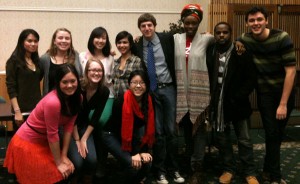When the Center for the Study of Culture, Race and Ethnicity was established, Ithaca College promised to offer minor programs in Latino/a Studies, African Diaspora Studies, Native-American Studies, and Asian-American Studies. Unfortunately, more than 10 years later, the college still has not allowed the “Center” — as it has been dubbed — to offer courses that use a critical lens to study Asian Americans. This is an issue that has been pushed aside for too long.

We are the Committee for Inclusive Education, a group of students dedicated to raising awareness among our peers and faculty on the importance of, and need for, an Asian-American Studies program on campus.
Previous efforts to create an Asian-American Studies minor began when senior Kaitlin Hibbs and juniors Kristiana Reyes and Kristy Zhen created a 10-minute documentary, “MIH: Missing in History,” last spring. The documentary, which focuses on the exclusion of Asian Americans from the curriculum offered at the college, has been instrumental in the identity formation of other marginalized groups on campus.
But the true goal of this committee is to emphasize intersectionality: the idea that while an Asian-American identity is not one most people on campus necessarily identify with, it is important because of our social and political interactions. Social stereotypes perpetuate the myth of the “model minority,” a concept that attributes success to cultural factors “inherent” to a certain race. Without political awareness of issues surrounding racial identity formation, policies to remove centers for cultural studies from academic institutions of all levels will go undisputed.

We want to emphasize that classes focused on marginalized people are not just for those who identify with those groups, but also for those who are unwittingly impacted by these groups’ marginalization. Without history that tells the story from the other side, we cannot acknowledge both sides and progress as a truly tolerant society.
Our intersectionality panel last Thursday addressed the issue of recognizing some identities, but excluding others. Members of the Lesbian, Gay, Bisexual, Transgender and Queer, Latino/a, African-American, Asian-American, White and Learning Disability communities were all present. Together, we discussed the necessity of education that teaches people about their individual identities and the struggles of each group. The purpose of this discussion was to show that no matter how individuals cultivate an identity consciousness, we are all part of the same movement for inclusion.
Helen Zia, a journalist and activist for the Asian-American and LGBTQ communities, once said diverse communities “cannot stay on the edge of obscurity, frustrated by images that have rendered [them] invisible and voiceless.” As we continue to advocate for the implementation of an inclusive education, we hope more students and faculty will support our cause by taking a class in the center and liking the Facebook page “AASP ASAP Asian American Studies program As Soon As Possible.” If the college fails to demonstrate its support for an Asian-American Studies program, then the IC 20/20 vision to increase diversity will ring hollow, and it will deny students the opportunity for an education inclusive of all peoples.
Laura Mendoza is a sophomore culture and communication major. Email her at [email protected]







